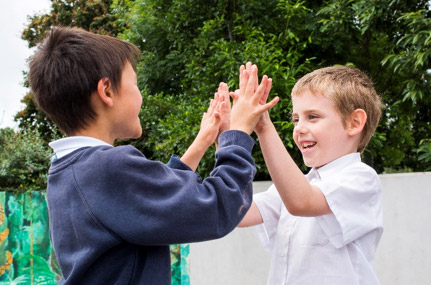Safe places to talk about God
Rowan Ferguson is Head of Schools Policy at the Church of England Education Office.
 Talking about God at school is crucial to ensuring children can know themselves and each other.
Talking about God at school is crucial to ensuring children can know themselves and each other.
There are some who feel religion has no place in school. I think this is a dangerous idea. The answer to the great challenges of ignorance and intolerance is to bring the reality of belief, in all its forms, into the daily lives of children. Encountering belief is part of shaping identity and fostering understanding of wider society. We do not exist in a vacuum, but in community. Through encountering our own traditions and histories, and those of others, we find a greater depth of maturity and expression.
Church of England schools offer a safe space to talk about God in an atmosphere of respect. Pushing discussion of belief out of school is more likely to create feelings of disaffection than providing for safe reflection. Last year I spoke at a conference of the Association of Muslim schools. It was hugely encouraging to talk with Muslim educators who agree that tolerance, curiosity and mutual understanding comes from places where talk about God is given space.
The education landscape is changing rapidly. Last year and the early part of this, much work was done to shape the Education and Adoption Act 2016. The newly published MOU follows many months of talks with government to set out principles and working practices to ensure the diocesan family of church schools is maintained as a key feature of this new landscape. Parents, teachers, governors and the million pupils in our schools can be reassured that the distinct ethos of their communities are secure for the future.
Church of England schools offer pupils opportunities to encounter God and ask the big questions Jonathan Sacks identifies in his book, Not in God’s Name: who am I? Why am I here? And how then shall I live? By exploring these questions through creating real understanding of faith in its many forms pupils gain values such as tolerance, and acceptance of difference and diversity.
 In many Church schools a good proportion of pupils are of another faith or none. To some it is counter-intuitive that the ritual and symbols of Christianity, present in our schools and deep in their ethos, do not put off Muslim or Jewish parents. Respect for and celebration of faith in our schools is widely welcomed by non-Christian parents and those without faith. In schools such as Bishop Bridgeman School in Bolton where 80% of the pupils are non-Christian, discussions about belief provide for an inclusive approach to faith, transparent but without indoctrination, and are reflected in relationships beyond the school gates.
In many Church schools a good proportion of pupils are of another faith or none. To some it is counter-intuitive that the ritual and symbols of Christianity, present in our schools and deep in their ethos, do not put off Muslim or Jewish parents. Respect for and celebration of faith in our schools is widely welcomed by non-Christian parents and those without faith. In schools such as Bishop Bridgeman School in Bolton where 80% of the pupils are non-Christian, discussions about belief provide for an inclusive approach to faith, transparent but without indoctrination, and are reflected in relationships beyond the school gates.
In the current education landscape focused on structure and standards, we are keeping our eyes focused on service to the 1 million pupils in Church of England schools, and continuing to build safe spaces in which they learn to flourish and grow.
